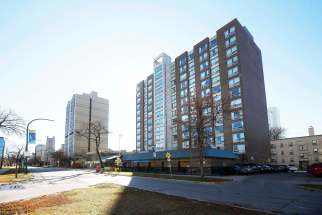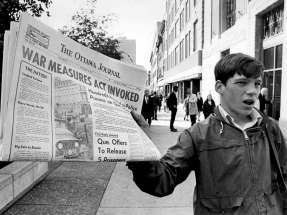Extraordinary measure invoked during crisis
Read this article for free:
or
Already have an account? Log in here »
To continue reading, please subscribe:
Monthly Digital Subscription
$0 for the first 4 weeks*
- Enjoy unlimited reading on winnipegfreepress.com
- Read the E-Edition, our digital replica newspaper
- Access News Break, our award-winning app
- Play interactive puzzles
*No charge for 4 weeks then price increases to the regular rate of $19.00 plus GST every four weeks. Offer available to new and qualified returning subscribers only. Cancel any time.
Monthly Digital Subscription
$4.75/week*
- Enjoy unlimited reading on winnipegfreepress.com
- Read the E-Edition, our digital replica newspaper
- Access News Break, our award-winning app
- Play interactive puzzles
*Billed as $19 plus GST every four weeks. Cancel any time.
To continue reading, please subscribe:
Add Free Press access to your Brandon Sun subscription for only an additional
$1 for the first 4 weeks*
*Your next subscription payment will increase by $1.00 and you will be charged $16.99 plus GST for four weeks. After four weeks, your payment will increase to $23.99 plus GST every four weeks.
Read unlimited articles for free today:
or
Already have an account? Log in here »
Hey there, time traveller!
This article was published 15/10/2020 (1883 days ago), so information in it may no longer be current.
Fifty years ago, then-prime minister Pierre Trudeau took an unprecedented step that still echoes in 2020.
It was on Oct. 16, 1970, that Mr. Trudeau invoked the War Measures Act — the first time in Canada’s history it had been used in peacetime — to quash a terrorist movement in Quebec that threatened to tear the country apart. The infamous “October Crisis” was triggered by the Front de libération du Quebec, a violent separatist group aiming to turn that province into an independent socialist state.
The FLQ had since the early 1960s engaged in a bombing campaign throughout Quebec, setting off more than 200 devices — including one that heavily damaged the Montreal Stock Exchange and injured 27 people — to further its political goals.

But on Oct. 5, 1970, the campaign escalated, when British diplomat James Cross was kidnapped at his Montreal home and the group demanded the release of detained or incarcerated FLQ members, and the broadcast of its manifesto on the CBC.
Five days later, Quebec’s deputy premier, Pierre Laporte, was kidnapped at gunpoint; his strangled body was found a week later in the trunk of a car near Saint-Hubert airport, outside Montreal.
The murder horrified Canadians and united the country in grief. In Quebec, sympathy among youthful sovereigntists for the FLQ began to evaporate. With the country on edge and elected officials in Quebec demanding police protection, Mr. Trudeau sent troops into the streets of Ottawa and Montreal.
On Oct. 13, CBC reporter Tim Ralfe famously asked Mr. Trudeau how far he would go to stop the FLQ. With a shrug, the prime minister uttered his now-famous reply: “Just watch me.”
Three days later, at the request of Quebec premier Robert Bourassa, Mr. Trudeau’s government invoked the War Measures Act, suspending basic civil rights and liberties and allowing police officers to arrest and detain people without probable cause or a warrant. Some of the more than 450 people arrested under the act were kept behind bars for 21 days, though most were released after a few hours without charge.
Half a century later, this curtailment of civil liberties still sparks bitter arguments, and there is a body of scholarly assessment that considers it a vast overreach, but at the time it was widely supported and quickly shattered the FLQ. Within months, the uprising had collapsed and 23 members of the group were in prison, four convicted of murder. A threat to form a 100,000-strong revolutionary army vanished into thin air.
In 1988, Ottawa replaced the War Measures Act with the less extreme Emergencies Act, which is subject to the Charter of Rights and Freedoms and forces cabinet to seek Parliament’s approval.
It is difficult to say precisely what lessons were learned from the crisis and the decision to invoke the WMA, but at the time the clear message to ardent separatists was that resorting to violence was morally and politically untenable.
What echoes today, however, is that Canadians in 1970, with a modicum of grumbling, were willing to endure a temporary suspension of their rights to put down an enemy that posed a deadly threat.
On the 50th anniversary of the key day in that long-ago crisis, most Canadians, despite a modicum of grumbling, are stoically following public-health orders such as the mandatory use of face masks in order to slow the spread of an invisible threat far more deadly and far-reaching than the FLQ.
Fifty years have not changed the simple fact that pragmatic Canadians are willing to endure sacrifices when lives are on the line.







